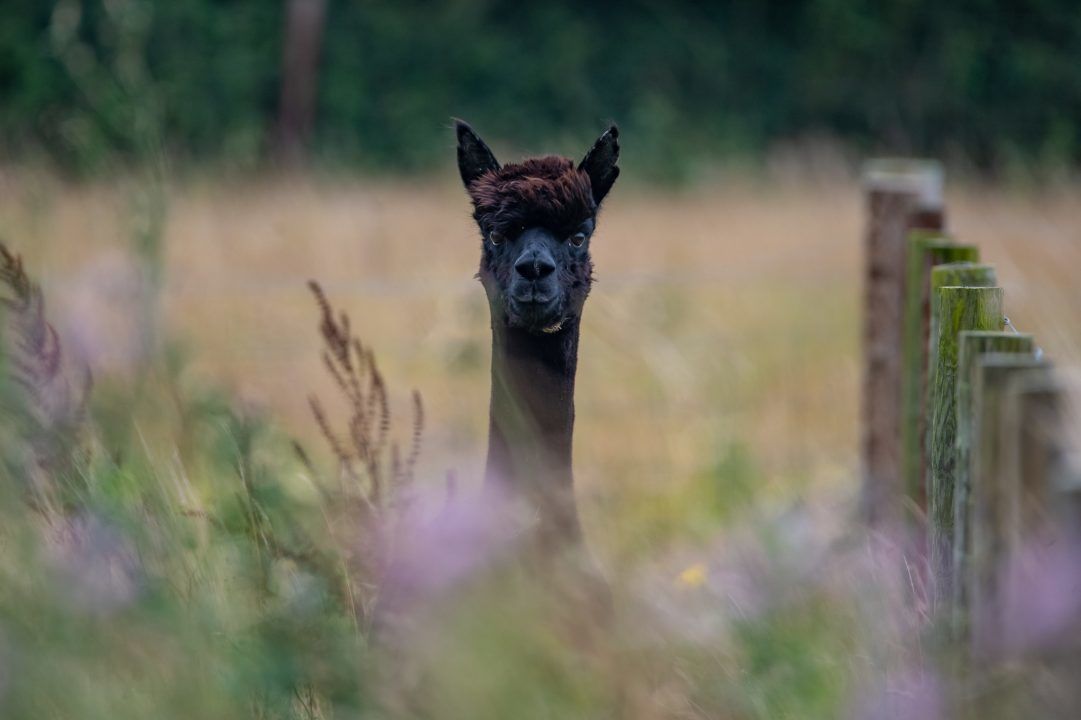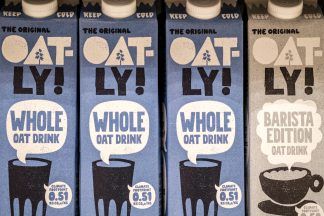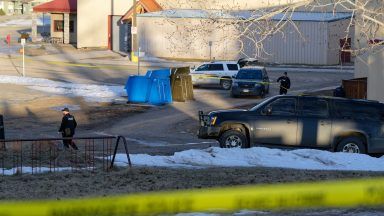An alpaca who faces being destroyed because the Government says he has bovine TB will live another day after an urgent High Court hearing was adjourned.
Geronimo has twice tested positive for bovine tuberculosis and the Department for Environment, Food and Rural Affairs (Defra) has ordered his destruction.
His owner Helen Macdonald, who imported him from New Zealand, believes the tests are returning false positives, but has been refused permission to have him tested a third time.
Earlier this month she lost her final appeal to save her beloved pet at the High Court in London and a warrant was signed for his destruction.
Ms Macdonald, who owns a farm at Wickwar, South Gloucestershire, has received an outpouring of support from the public, with more than 130,000 people signing a petition calling on Boris Johnson to halt the killing.
On Tuesday, an urgent application for a temporary injunction to halt the enforcement of the destruction order was considered by Mrs Justice Stacey at the High Court in London.
However, the judge said she would need further information from Ms Macdonald and from Government lawyers before she could make her decision, and said she will resume the hearing on Wednesday afternoon.
Ms Macdonald’s lawyers told the court Geronimo first tested positive for bovine tuberculosis in September 2017 and has been in isolation since.
Catrin McGahey QC told the court that, although Defra argued in previous hearings that there was a “residual risk” to other animals, the agency has also agreed that Ms Macdonald’s bio-security arrangements are “impeccable”.
She said it had come to light following the publicity resulting from Ms Macdonald’s case that other animals who have been subjected to the same testing regime as Geronimo have later showed no signs of the disease after being euthanised.
Ms McGahey said: “The only issue is whether the defendants should have disclosed the fact that they had in their possession evidence that other camelids who had been subjected to repeated priming had gone on to test positive in Enferplex tests, and that there had been no sign of bovine tuberculosis on post-mortem examination.”
The barrister said the publicity had led the Daily Mail to find the owners of nine other camelids who were tested under the same regime, whose animals showed no signs of the disease after slaughter.
She told the court: “That information absolutely should have been before the two (previous) judges.
“We don’t know if there are more than nine camelids … what we do know is that Defra holds this information.”
Ned Westaway, for Defra and the Animal and Plant Health Agency, said Ms Macdonald has no right of appeal against the last High Court decision, and that this latest court bid was based on “speculation” in a newspaper article.
He said: “The applicant has lost repeatedly in this case, in my submission this is a case that has come very much to the end of the road.”
Mr Westaway added: “The suggestion of material non-disclosure is, frankly, unfounded.”
At one stage Mr Westaway said there was “no smoking gun” in the Daily Mail article, to which the judge responded: “I’m not sure that is an appropriate metaphor, given the subject.”
The judge said she would like Ms Macdonald’s lawyers to decide what evidence they wish Defra to produce and a time estimate of how long that may take before she reaches her decision on whether to grant the injunction.
Mr Westaway said Defra will not execute the warrant until this issue is resolved.
The judge said the delay for that further information to be obtained was no indication of her ultimate decision, which will be made following another hearing at 3.30pm on Wednesday.
She added: “In saying that, please do not take it as any indication one way or another. I am undecided as to whether the application for interim relief should succeed, should not succeed, or is totally without merit.”
If the judge refuses the application, Defra will be able to slaughter Geronimo as there is no further right of appeal for Ms Macdonald.
If she grants the application, he will survive until a further hearing can be held which is likely to determine whether there was a material non-disclosure on Defra’s part in the earlier proceedings and whether the case should be reopened.
Last week the Government insisted that all the evidence on the animal’s condition had been “looked at very carefully”.
A Defra spokesman said: “There are no plans to execute the warrant today.”
They added: “We are sympathetic to Ms Macdonald’s situation, just as we are with everyone with animals affected by this terrible disease.
“It is for this reason that the testing results and options for Geronimo have been very carefully considered by Defra, the Animal and Plant Health Agency and its veterinary experts, as well as passing several stages of thorough legal scrutiny.
“Bovine tuberculosis is one of the greatest animal health threats we face today and causes devastation and distress for farming families and rural communities across the country while costing the taxpayer around £100 million every year.
“Therefore, while nobody wants to cull infected animals, we need to do everything we can to tackle this disease to stop it spreading and to protect the livelihoods of those affected.”
Ms Macdonald’s lawyers have written to Environment Secretary George Eustice to suggest Geronimo’s life could be saved and instead he could be studied for research.
The British Alpaca Society said the current stand-off between Defra and Ms Macdonald has “considerably undermined confidence” in the voluntary bovine TB testing regime in the UK.
As well as alpacas, badgers have been a victim of the fight against bovine TB, with mass culling employed to stop the spread since 2013, sparking a huge public backlash.
Follow STV News on WhatsApp
Scan the QR code on your mobile device for all the latest news from around the country


 SWNS via SWNS
SWNS via SWNS
























